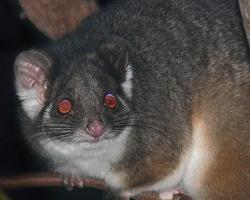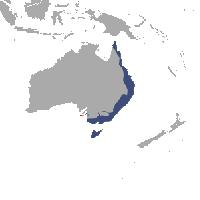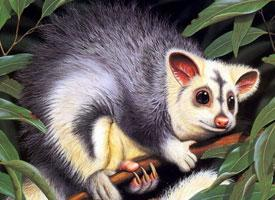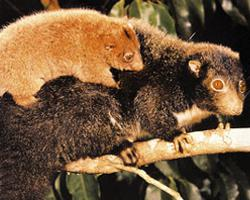
Weights and measures
| Length | from 30 to 35 cm |
|---|---|
| Weight | from 700 to 1100 g |
State of endangerment
| Non Endangered |
Animal description
The Common ringtail possum (Pseudocheirus peregrinus) is a captivating marsupial species native to Australia. Exhibiting a moderate size, this species is distinguished by its unique prehensile tail, which is adeptly used for grasping and hanging from branches, significantly aiding in its arboreal lifestyle. The tail is typically longer than the possum's body and features a white tip, contrasting with the rest of its fur, which ranges from grey to reddish-brown.This possum has a small, rounded head with large, forward-facing eyes that are adapted to its nocturnal habits, enhancing its night vision. Its ears are relatively large and rounded, adding to its keen senses which are crucial for navigating the treetops in the dark. The body of the Common ringtail possum is covered in thick, soft fur, providing insulation against the variable temperatures of its environment.
One of the most fascinating aspects of the Common ringtail possum's behavior is its social structure. Unlike many other possum species that lead solitary lives, the Common ringtail possum often lives in small family groups. These groups construct elaborate nests known as "dreys," made from twigs and leaves, where they rest during the day. These nests are a critical component of their survival, offering protection from predators and harsh weather conditions.
The diet of the Common ringtail possum is predominantly herbivorous, specializing in the consumption of leaves, flowers, and fruits. This possum has a unique digestive system that is highly efficient at breaking down the tough leaves of eucalyptus trees, which constitute a significant part of its diet. The ability to detoxify the eucalyptus leaves, which are poisonous to many animals, allows the Common ringtail possum access to a food source with limited competition.
Reproduction in the Common ringtail possum involves the birth of very small and underdeveloped young, which then continue to develop in the mother's pouch. This marsupial is known for its extended maternal care, with offspring often staying with their parents for a considerable time before becoming independent.
The Common ringtail possum plays a crucial role in its ecosystem, not only as a prey species for larger predators but also in seed dispersal and the control of vegetation through its feeding habits. However, like many native Australian species, it faces threats from habitat destruction, predation by introduced species, and climate change.
Despite these challenges, the Common ringtail possum has shown a remarkable ability to adapt to urban environments, where it can often be seen navigating garden trees and shrubs. Its adaptability, combined with legal protection, has helped maintain stable populations in many areas, though conservation efforts remain important to ensure the species' long-term survival.
In summary, the Common ringtail possum is a unique and fascinating marsupial, with its prehensile tail, social behavior, and specialized diet highlighting the incredible diversity of Australia's wildlife. Its presence in both natural and urban environments underscores the importance of coexistence and conservation efforts to protect these remarkable creatures and their habitats.
Map of occurrence

Similar Animals
New photos of animals
Top 10 animals
- Dolphin gull (Leucophaeus scoresbii)
- Diana monkey (Cercopithecus diana)
- Moustached guenon (Cercopithecus cephus)
- Galápagos tortoise (Geochelone nigra complex)
- Japanese macaque (Macaca fuscata)
- Russian tortoise (Testudo horsfieldii)
- Stone loach (Barbatula barbatula)
- Greek tortoise (Testudo graeca)
- Common flying dragon (Draco volans)
- Vendace (Coregonus albula)

